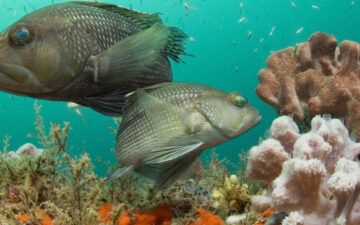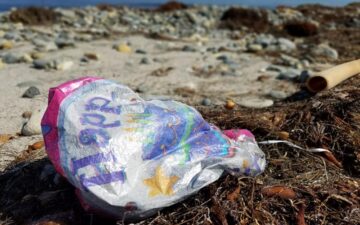The Seventh Assembly of the Global Environment Facility (GEF) took place in Vancouver, Canada, on the traditional and unceded lands of Musqueam, Squamish, and Tsleil-Waututh nations. The Assembly meets every four years, and it is the body that coordinates the financing efforts to address environmental threats, such as climate change, biodiversity loss, pollution, and different factors inhibiting land and ocean health. It brought together 185 environmental leaders from different countries, governments, international organizations, businesses, academia, and civil society. Among them were the voices of Indigenous communities, women, and the youth.
The Ocean Foundation, as an observer organization, had the opportunity to observe the GEF’s efforts in integrating civil society organizations and fostering new partnerships for global objectives, specifically in the realm of ocean conservation. We have previously collaborated on GEF projects and are enthusiastic about proposing new projects in collaboration with various partners. Our participation in the GEF assembly was a positive and welcoming experience.
“So now we will not only speak of integration, but also of inclusiveness and impact. We will give civil society, women, Indigenous groups, the youth, a possibility to share in the decision-making process of the GEF partnership. We will actively involve the philanthropic organizations and, of course, the private sector. We will examine sub-national levels of decision making as well.”
– GEF CEO Carlos Manuel Rodríguez
The Assembly launched the Global Biodiversity Framework Fund agreed upon in COP15 in Montreal in December 2022 as part of the GEF Council’s decision to support the implementation of the Kumming-Montreal Global Biodiversity Framework. The Assembly also adopted amendments to the Instrument for the Establishment of a restructured GEF, enabling it to serve the High Seas Treaty adopted in New York City in June 2023. The Treaty opened for signature this month- September 2023.
As part of the Assembly, other meetings such as the Dialogue with Multilateral Environmental Agreement (MEA) Secretariats and GEF took place, an Indigenous and Local Knowledge Event, and the first ever Partnership Forum, which discussed how GEF can support the recognition and empowerment of Indigenous Peoples, youth, women and civil society.
Key takeaways:
In a keynote address by Rashid Sumaila from the University of British Columbia, he discussed the importance of saving the ocean through three key points:
- Infinity Fish Concept: Sumaila introduced his book, “Infinity Fish,” emphasizing the idea that fish can be a sustainable and renewable resource for humanity if managed responsibly.
- Universal Education Access: It was highlighted during the discussion that universal access to education, particularly for girls and boys, is crucial in addressing ocean conservation challenges.
- Engaging Diverse Voices: To find solutions for ocean conservation, there was an emphasis on the active engagement of youth, women, and Indigenous leaders, recognizing their important roles in shaping a sustainable future for our oceans.
The roundtable discussion centered on the topic of “Increasing Policy Coherence across Sectors to Bridge the Funding Gap for Nature and Climate.” Key points included:
- Perspective of Decision Makers: Representatives discussed the importance of policy coherence and its role in addressing the funding gap for nature and climate initiatives.
- Challenges and Enabling Conditions: Decision makers shared their views on the challenges and conditions necessary to enhance policy coherence. They also explored ways to facilitate these conditions at both national and international levels.
- Innovative Instruments and Mechanisms: The discussion touched upon innovative tools, mechanisms, and frameworks that could help improve policy coherence for nature and climate initiatives.
GEF CEO Rodríguez emphasized the need for nations to break down silos and work collaboratively through effective policy implementation, recognizing policy as a powerful instrument for driving positive change in these critical areas.
The roundtable discussion, moderated by Thomas Tomich from the University of California, Davis, focused on the challenge of bridging the gap between science and policy for a healthier planet and people. Key points from the discussion included:
- Complex Systems as “Wicked Problems”: Tomich referred to the transformation of complex systems as a “wicked problem,” signifying its multifaceted and challenging nature.
- Elements of Effective National Policy: Sara Scherr, President of EcoAgriculture Partners, highlighted the importance of effective national policy, which should explicitly recognize local partners, institutionalize technical services, provide access to financial and business information, and encourage knowledge exchange.
- Science and Policy Integration: M. Sanjayan, CEO of Conservation International, emphasized the need to bridge science and policy, highlighting that while science objectively uses data and tests hypotheses, its application relies on policy, community engagement, an understanding of local needs, and Indigenous wisdom.
- Measuring Human Development: Kwaku Afriyie, Minister of Environment, Science, Technology, and Innovation in Ghana, advocated for measuring human development rather than focusing solely on economic growth and questioned the use of market mechanisms.
- Knowledge into Action: Ani Dasgupta, President of the World Resources Institute, stressed that knowledge must result in tangible change, emphasizing the importance of evidence gathering, on-the-ground application, and scaling up successful outcomes.
- Addressing “Wicked Problems”: Blake Ratner from GEF STAP emphasized that solving “wicked problems” requires a comprehensive understanding of how human systems function and urged real-time evaluation of policies to navigate these complex challenges.
Overall, the discussion underscored the need for holistic approaches that combine scientific knowledge with effective policies, community engagement, and a focus on human well-being and sustainability.







